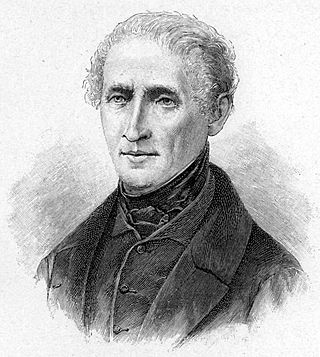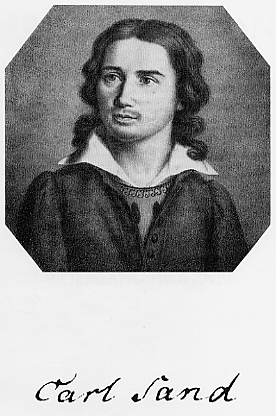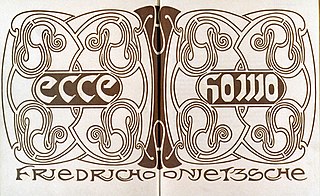
Joseph Freiherr von Eichendorff was a German poet, novelist, playwright, literary critic, translator, and anthologist. Eichendorff was one of the major writers and critics of Romanticism. Ever since their publication and up to the present day, some of his works have been very popular in German-speaking Europe.

Beyond Good and Evil: Prelude to a Philosophy of the Future is a book by philosopher Friedrich Nietzsche that covers ideas in his previous work Thus Spoke Zarathustra but with a more polemical approach. It was first published in 1886 under the publishing house C. G. Naumann of Leipzig at the author's own expense and first translated into English by Helen Zimmern, who was two years younger than Nietzsche and knew the author.

Felix Ludwig Julius Dahn was a German law professor and nationalist author, poet and historian.

Karl Ludwig Sand was a German university student and member of a liberal Burschenschaft. He was executed in 1820 for the murder of the conservative dramatist August von Kotzebue the previous year in Mannheim. As a result of his execution, Sand became a martyr in the eyes of many German nationalists seeking the creation of a united German national state.

The Gay Science is a book by Friedrich Nietzsche published in 1882, and followed by a second edition in 1887 after the completion of Thus Spoke Zarathustra and Beyond Good and Evil. This substantial expansion includes the addition of a fifth book to the existing four books of The Gay Science, as well as an appendix of songs. It was described by Nietzsche as "the most personal of all my books", and contains more poems than any of his other works.

Ecce Homo: How One Becomes What One Is is the last original book written by philosopher Friedrich Nietzsche before his death in 1900. It was written in 1888 and was not published until 1908.

The Case of Wagner is a book by the philosopher Friedrich Nietzsche, originally published in 1888. Subtitled "A Musician's Problem".

Eduard von Martens also known as Carl or Karl Eduard von Martens, was a German zoologist.
This is a list of writings and other compositions by Friedrich Nietzsche.
Heidegger Gesamtausgabe is the title of the collected writings of German philosopher Martin Heidegger (1889-1976), published by Vittorio Klostermann.

Untimely Meditations, also translated as Unfashionable Observations and Thoughts Out of Season, consists of four works by the philosopher Friedrich Nietzsche, started in 1873 and completed in 1876.
Paulus Stephanus Cassel, born Selig Cassel, was a German Jewish convert to Christianity, writer, orator, and missionary to Jews.

Pirmin Stekeler-Weithofer is a German philosopher and professor of theoretical philosophy at the university of Leipzig. He was the president of the international Ludwig Wittgenstein society (2006-2009) and is now a vice-president of this institution.

Eugen Oswald, was a German journalist, translator, teacher and philologist who participated in the German revolutions of 1848–49.

Andreas Urs Sommer is a German philosopher of Swiss origin. He specializes in the history of philosophy and its theory, ethics, philosophy of religion, and Skepticism. His historical studies center on the philosophy of Enlightenment and Nietzsche, but they also deal with Kant, Max Weber, Pierre Bayle, Jonathan Edwards, and others.
Friedrich August Carus was a German philosopher. He was the father of surgeon Ernst August Carus (1797–1854).
Rudolf Johannes Pesch was a German Catholic theologian.

Friedrich-Wilhelm von Herrmann was a German philosopher. He was known for his expertise on Heidegger's thought, having worked with him at the University of Freiburg from 1972 to 1976. Herrmann taught there as professor from 1979 to 1999.
Wolfgang Kosack /'vɔlfgaŋ 'ko:zak/ is a German Egyptologist, translator and Coptologist.

On the Advantage and Disadvantage of History for Life is a work by Friedrich Nietzsche published in 1874 and the second of his four Untimely Meditations. The treatise is considered an important work from Nietzsche's early creative period. In it, he criticizes his academic contemporaries who, in his opinion, either overestimate or misjudge the importance of history. This work also anticipates Nietzsche's later themes and has received comparatively great attention.













